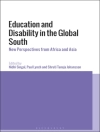Whereas most studies of migration focus on movement, this book examines the experience of staying put. It looks at young men living in a Soninke-speaking village in Gambia who, although eager to travel abroad for money and experience, settle as farmers, heads of families, businessmen, civic activists, or, alternatively, as unemployed, demoted youth. Those who stay do so not only because of financial and legal limitations, but also because of pressures to maintain family and social bases in the Gambia valley. ‘Stayers’ thus enable migrants to migrate, while ensuring the activities and values attached to rural life are passed on to the future generations.
Inhaltsverzeichnis
List of Illustrations
Acknowledgements
Notes on Transliteration
Abbreviations
Introduction
- From Ploughing the Sea to Navigating the Bush
- Soninke Migration and the Young Men Who Stay Put
- ‘Sitting’: Creating and Inhabiting Immobility
- The Onus of Rural Permanence
- On Bush-bound Ethnography
- Overview of the Book
- A Brief Note on The Gambia
Chapter 1. Peasants by Other Means:(Im)mobility and the Making of a Village Mooring
- ‘Sitting’ Sabi, Creating Movement, 1902 – ca.1945
- The Farmer-trader
- New Routes and Roots in the Post-war Period
- Parting Sedentary and Migrant Livelihoods: 1970s – Present
- Bush Troubles: the Decline of the Rural Economy
- The Rise of International Labour Migration
- Barriers to International Migration
- Diasporization, Transnationality and Urban Homes
- The Traveller, the ‘Sitter’ and the Urban ‘Sitter’
Chapter 2. Being-on-the-land: The Agri-culture of Migration
- Of Bushmen and Moneymen
- Earning Calloused Hands: The Embodiment of Rural Suffering
- Cultivating an Agrarian Ethos
- From Bush to Travel-bush
- The Alienation of the Farmer?
Chapter 3. Looking for Money: Livelihood Trajectories in and out of Mobility
- The Social Currency of Money
- Locating the Bounty: Routes and Destinations
- Two Hustlers
- Navigating the Political Economy
- Stranded in Circulation: From Spurious Travel to ‘Sitting’
- Wind in the Sails: the Economy of Support
Chapter 4. Just Sitting: The Spectre of Bare Immobility
- Ghetto Youth: (Em)placing Male Sociability
- Stilled Bodies and Burdened Heads
- The Nerves Syndrome
- Waiting: The Stilled Time of Sitting
- The Virtue of Patience: Temporal Fixes to Spatial Problems
Chapter 5. Hesitant Patriarchs: Becoming a Household Head
- The Ka
- Becoming a Kagume: Ascent to Power or Buck Passing?
- In a Meal Bowl: Ensuring Subsistence in an Extraverted Domestic Economy
- Around a Meal Bowl: Creating Conviviality and Male Authority
- Governing Change: Cooperation, Conflict and Translocality in Household Formation
Chapter 6. Civic Leaders? Reviving the Age Groups, Recapturing Permanence
- The Sappanu
- Youth, in the Active Voice
- The Sabi Youth Committee
- Quiet Ceremonies: Legal Innovation and Socio-moral Reforms
Conclusion: Possibilities
- If…
- Placing Immobility in Migration
- Trailing on
Glossary
Bibliography
Über den Autor
Paolo Gaibazzi is a Social Anthropologist and a Research Fellow at the Leibniz-Zentrum Moderner Orient (ZMO), Berlin. In addition to (im)mobility in the Gambia, he has published on West African post-slavery, Euro-African borders and West African Muslim traders in Angola.












